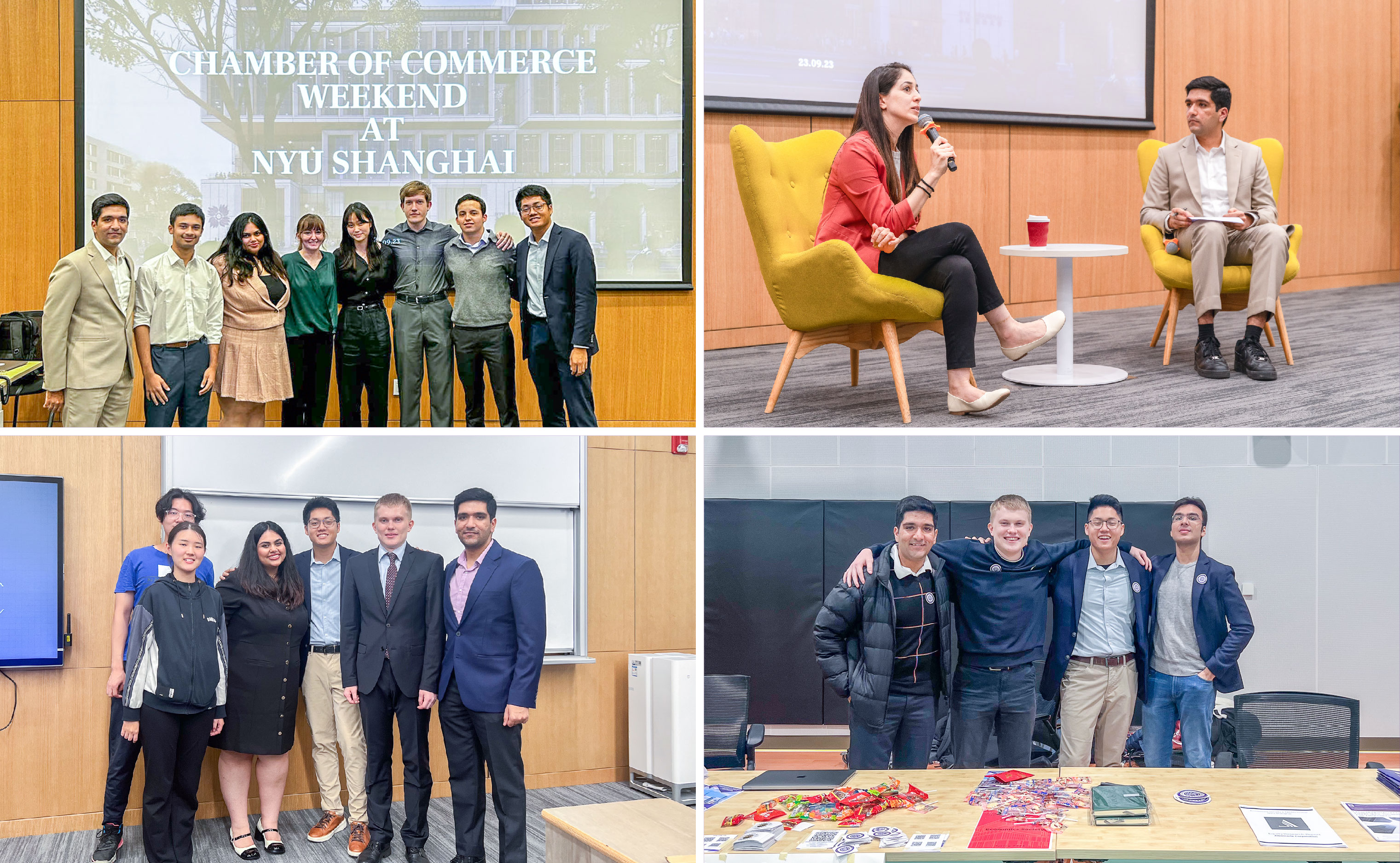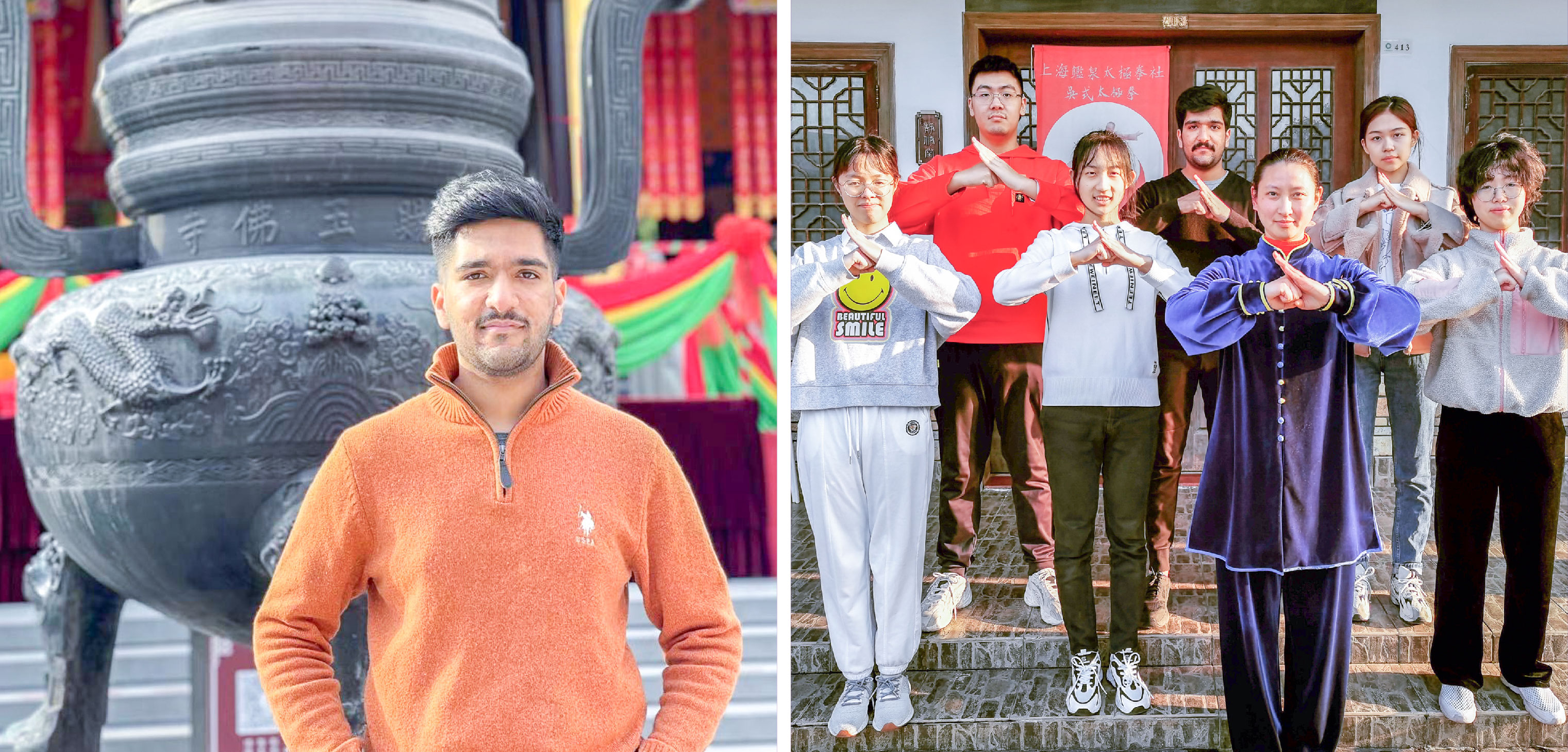
Throughout Shreesh Tripathi ’24’s life, an invisible thread has connected him from his home country of Nepal to its neighbors, India and China. An economics major at NYU Shanghai, Tripathi says it was a humble cereal box that jump started his fascination with the interconnectedness of the global economy.
Tripathi remembers a teacher in high school asking his class to study breakfast cereals to analyze the impact of marketing on children. His teacher pointed out that the cartoon characters’ eyes on the cereal box packaging looked straight out, inviting children to “make eye contact” with them. In that moment, he says, something clicked, and he grasped not only the underpinnings behind marketing and psychology, but also a connection to something much larger than himself.
“That is when I realized economics is not just [about] money, it's also about how people interact and how thinking works in the first place,” he says. In hindsight, he says, this moment was also the catalyst for an academic interest that would lead to hours of research into the economic connections between Nepal and China.
Studying at NYU Shanghai allowed him to explore these connections while at the same time experiencing them firsthand. “There could not have been any other place besides China that truly resembles how these things work in the current day and age,” Tripathi says.
While he explored a number of different academic paths, Tripathi ultimately settled on a major in economics, after taking Introduction to Political Theory with Global Network Associate Professor of Political Science Professor Rahul Sagar, which inspired him to study how societies, governments and people work.

Left: Tripathi biking along the Yangtze River on a trip to Chongming Island. Right: Tripathi and two friends biking in Hangzhou in Spring 2024.
“Economics adds a little bit of everything, and it's almost as if it's an introduction to the world,” Tripathi says. His passion for economics led him to co-found the Economics Society in his second year at NYU Shanghai. Over the years, the club has grown to 150 members and puts on regular weekly events.
While studying abroad in New York, Tripathi also had the opportunity to travel to Washington, DC, which he says was eye-opening. “I walked in front of the IMF (International Monetary Fund) and it was almost like I was watching the center for development around the world in front of me. In that moment, I could only imagine all of the decisions being made inside those buildings,” he remembers.
Tripathi says seeing decision-makers walk in and out of the nation’s most critical policy-making institutions was surreal. He says observing the lawmakers in DC was further inspiration for the vision he has for his home country. “I would like to see something like this in Nepal, like a physical building, where people are meeting to make decisions about relations, not only between Nepal and India, but Nepal and China and Nepal and Southeast Asia.” Having experienced these types of cross-cultural and transnational connections at NYU Shanghai, Tripathi has aspirations to contribute to these relationships at a broader level in the future.

Top left: The Economics Society at a weekend of events with Chambers of Commerce from several countries in Fall 2023. Top right: Tripathi moderating a panel during the Chamber of Commerce Weekend. Bottom left: Tripathi serving as president of the Economics Society with his Executive Board members in 2023 Bottom right: Tripathi and Economics Society members recruiting new members at Club Fair 2024.
While studying away at NYU New York, Tripathi enrolled in Professor of History Tansen Sen’s course The Concept of China, which he described as “life changing.” “That is the class that defines what liberal arts education means for me,” he says. “That is when all of my courses started to add up: the Global Perspectives on Society, literature, math, and economics classes.”

Left: Visiting the Jade Buddha Temple in Spring 2021. Right: Shreesh and other students at a tai chi training session in Spring 2022. This session was held completely in Chinese, and was one of the other times he realized he was getting better in Chinese.
Reflecting on his liberal arts education, Tripathi compares it to Plato’s Allegory of the Cave, a work he studied while taking a political theory class. “Before college, I was the prisoner in the cave,” he says. “I thought I knew how things worked outside in the world, but I only saw the shadows.”
He says being exposed to a variety of disciplines from literature, reading, writing, history, and politics has allowed him to develop a more well-rounded and holistic view of how not only economics works, but also how people work.
That comprehensive mindset, he believes, is what landed him an internship with Professor Sen at NYU Shanghai’s Center for Global Asia, where Sen is director. Tripathi incorporates a mix of history, international relations, and politics in his main project, developing a timeline of China’s economic involvement in Nepal throughout the past three decades.
To do this, he peruses academic journals, dissecting scholarly research on China and Nepal’s economic and social cooperation through China’s Belt and Road Initiative. Tripathi says once he gathers all the necessary components, the timeline will reveal larger implications for the future of Nepal-China relations.
“Everything that's happening around the world is influenced by China in a way, and the same goes for India as well,” Tripathi says. “Since Nepal is stuck in between these two countries, there will be a spillover effect in the next decade or two. There will be some economic and migrational activity flowing from China to Nepal.”
Professor Sen speaks highly of Shreesh. “Shreesh has the potential to emerge as a leading economist with regard to China-Nepal relations,” he says. “There is a dearth of such economists and his training at NYU Shanghai, including in Chinese language and history, will make him a unique and much sought-after expert.”
Tripathi’s senior capstone project relates to his research at the Center for Global Asia. He examines fluctuations in poverty in the participating countries of the Belt and Road Initiative and is exploring the impact of BRI on China’s neighboring developing countries.
Tripathi’s capstone advisor, Associate Professor of Practice in Economics Amanda Zhou, praises him for his dedication. “Shreesh is highly motivated and has strong self-learning skills. He is very passionate about policies that could alleviate poverty,” she says.
Outside his academic pursuits, Tripathi has enjoyed the opportunity to explore many interests while at NYU Shanghai, from cooking to biking to tai chi. He and his friends organized weekly bike trips around Shanghai to explore the city and he worked as a student worker in many departments around campus. But it was his experience as a residential advisor in his junior and senior year that really helped him grow as a person, he says.
“I used to call myself an introvert, but now I see myself mingling more with people,” he says. “I make it intentional now to ask other people around me about their opinions and thoughts, and it’s helped me move toward a more well-rounded personality.”
Looking back at his time at NYU Shanghai, Tripathi describes his experience as “enlightening.” “I am not just looking at my perspective,” he says. “I'm looking at several different perspectives at the same time, so that has transformed me.” This summer, Tripathi will continue on in a research position under Professor Zhou, focusing on exploring international trade, development economics, and e-commerce in countries participating in the Belt and Road Initiative.

